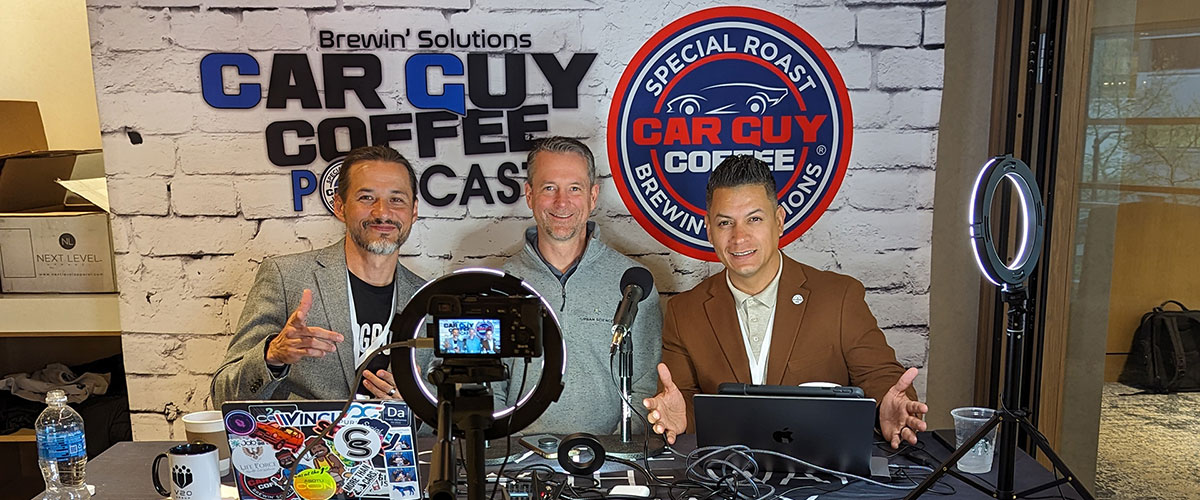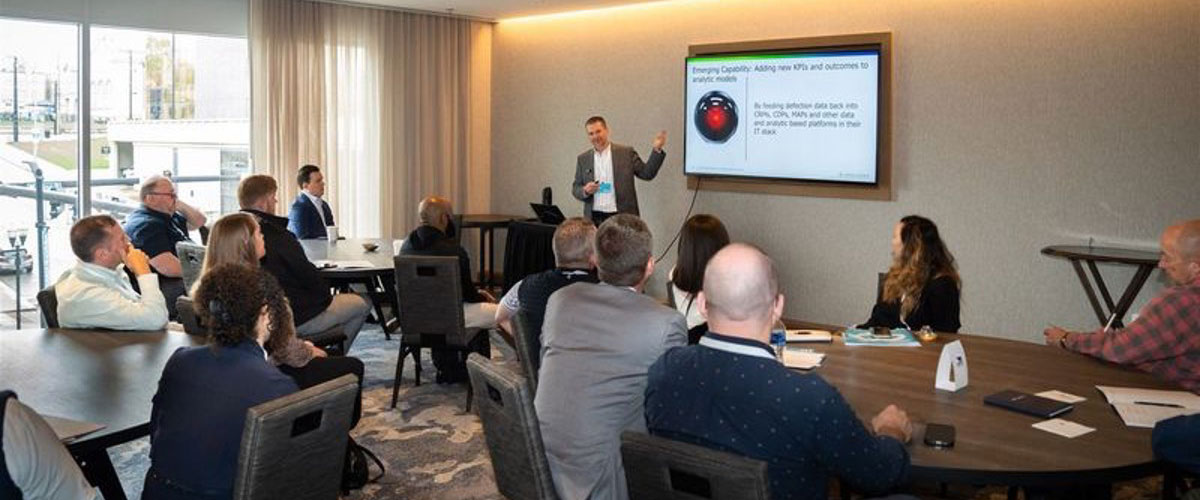![]()
2024 Dealership
Transformation Index
应对关键的汽车零售挑战:Kain 客户与朋友 2024 年 Urban Science 的见解
Lost sales, also known as defections, are a central concern among dealers. To address these concerns, Eric DeMont, Global Practice Director at Urban Science, spoke on the impact of using defection insights at the Kain Clients & Friends Digital Success Workshop this spring. Eric also shared key considerations derived from Urban Science research, conducted alongside the Harris Poll, providing an inside look into how dealers can optimize their performance based on today’s auto buyers.

Defection rates have remained above 17% over the last 20 months, which dealers consider far too high. Adding to the challenge, the most lucrative leads—those who are higher educated, higher net worth, higher income, and homeowners—defect at higher rates compared to low earners and renters. While these high earners can afford to wait for the vehicle that fits their specifications, almost all shoppers are facing anxiety over affordability concerns. Options for vehicles priced under $35,000 have become fewer, and in the absence of manufacturer vehicle incentives, the financial aspect of the transaction is more critical than ever before.
Surveyed auto buyers confirm their concerns around affordability:
- 67% marked affordability as their top concern
- 65% indicated they would choose to purchase at the dealership offering the best vehicle price
- 48% expressed worries about high gas prices, vehicle servicing costs, and car insurance expenses
- 47% would choose the dealer with the best trade-in value
So, how can dealers position themselves for success despite these challenging affordability factors?
SALES警报
Know your lost sales.
Being able to understand and alleviate consumer pain points during the purchasing process will result in reduction of defections.
了解更多
Dealers now rely on leads more than ever. In fact, 76% of retailers say leads are more important than they were just five years ago. However, managing leads has become increasingly challenging. Consumers are inundated with unwanted emails, texts, and calls, leading them to ignore or filter out many communications they see as spam, making customer contact more difficult. Currently, about two-thirds of dealers (65%) utilize AI tools to enhance their lead-handling efforts, while the remainder lag behind in this regard.
Dealers are eager to know how they can leverage AI tools to enhance lead management and engage with customers who have visited the dealership but left without making a purchase. Urban Science research reveals that 62% of dealers recognize improved lead management and conversion rates as key benefits of AI tools, indicating additional opportunities for those who have yet to adopt them.
Urban Science’s findings highlight dealers’ perspectives and usage of AI:
- 61% say AI makes marketing campaigns more effective
- 53% see enhanced efficiency in sales and marketing processes
- 51% recognize improved customer engagement and satisfaction as a result of AI implementation
- 48% see increased sales and revenue as a significant benefit of AI-based tools
- 83% utilize AI tools for customer data analysis and insights
- 76% employ these tools for sales tracking purposes
- 75% utilize AI for automated lead response
However, despite these advantages, 50% of dealers surveyed said their biggest concern about using AI tools is privacy issues, while 44% feel apprehensive about the complexity of integrating AI with existing systems.

While AI is proving instrumental in enhancing follow-up processes, dealers still grapple with the lack of defection insights. On average, dealers invest three to five minutes attempting to follow up with a lead over a period of two to three weeks, yet these activities are often performed without crucial insights regarding whether the lead they’re diligently pursuing has already purchased from another dealer.
“We don’t have a very connected network of lead follow-ups, and we are short-staffed, so we have to assume after a certain period of time the client has decided to go with someone else,” explained one dealer surveyed by Urban Science. “We won’t know for sure unless we see that client again.”
DEALERSHIPPERFORMANCE
Leading dealers are increasingly turning to Urban Science’s Dealership Performance Solutions.
了解更多

SalesAlert™ empowers dealers to efficiently track lost sales and enhance their close rates by directing their attention toward leads that are still actively in the market. By leveraging SalesAlert, dealers harness the power of Urban Science’s industry sales data, updated daily, to review defections. These timely insights are instrumental in driving efficiency and profitability across sales and marketing operations, thereby bolstering market share. They help dealers understand when to halt their sales efforts and adapt their follow-up processes accordingly, creating more effective workflows and better experiences for customers – including those who have already defected but have the potential to come back for service or a future purchase.
Furthermore, TrafficView™ utilizes Urban Science’s unrivaled data and proven scientific methodologies to aid dealers in enhancing sales effectiveness. It identifies areas for coaching, mentoring, and incentivizing, by break down defections into lead source, salesperson, models (including down to trim level) and geographies. Ultimately refining the customer experience and informing tailored messaging and inventory strategies.
Survey data also shows that incentives can play a crucial role in consumers’ choice of dealer, with one-third of auto buyers indicating incentives could influence which dealership they purchase from. Notably, over 80% of auto buyers said a $35 incentive would motivate them to test-drive a vehicle or bring their vehicle in for service. With affordability being a top obstacle, these insights signal a significant opportunity for dealers to deliver targeted incentives to motivate action – such as those issued through Urban Science’s AutoHook® solution.
Leading growth-minded dealership leaders – particularly those at the group level – are also leaning on Urban Science’s MarketGrowth™ solution, identifying investment opportunities in any market and providing competitive visibility into the effectiveness of other groups and dealers in that market.
In today’s dynamic automotive retail landscape, leveraging the power of science to position sellers to thrive in the short and long term is more important than ever. For more information about implementing these strategies, feel free to reach out to Eric DeMont at ekdemont@urbanscience.com.
Source: Urban Science Online Auto-Buyer and Dealer Studies, February 2024. These surveys were conducted by The Harris Poll on behalf of Urban Science among 3,005 U.S. adults aged 18+ who currently own or lease or plan to purchase or lease a new or used vehicle in the next 12 months and 250 U.S. OEM automotive dealers, whose titles were Sales Manager, General Manager, or Principal/VP/Owner.
For complete survey methodology, including weighting variables and subgroup sample sizes, please contact Amy Bowering (arbowering@urbanscience.com).
最新见解
How One Urban Scientist Helped Spark a Love of Reading in Nashville
Community service isn’t always glamorous. In fact, many times it requires sacrifice and sweat equity. Sometimes it looks like cardboard dust, ink-smudged thumbs and a row of bankers’ boxes filling […]
A Stage for Change: Urban Scientist Volunteers with SB Teatro in Rome
Each year, our company’s Community Giving Initiative empowers employees to transform individual passions into meaningful community support. The program invites Urban Scientists to nominate a nonprofit close to their hearts […]
第四季度电动汽车零售销售报告
This Q4 electric vehicle* (EV) retail sales report features Urban Science’s proprietary 2025 sales insights through January 2nd, 2026…

